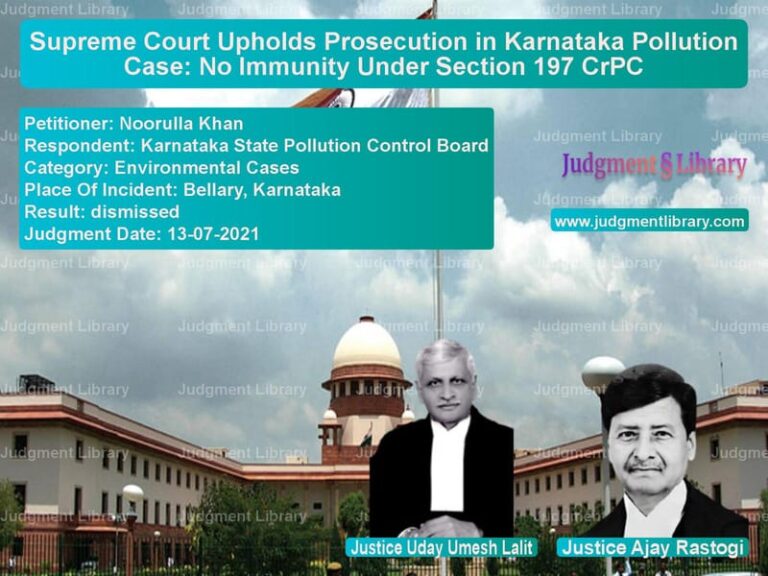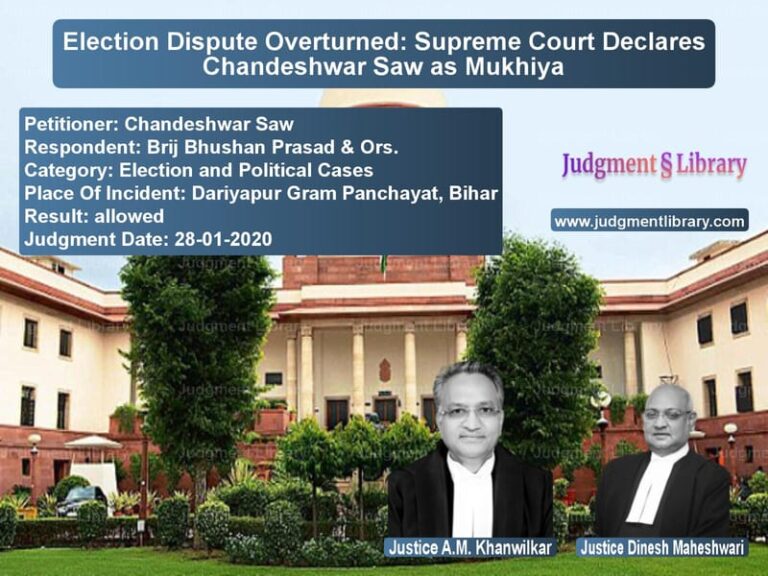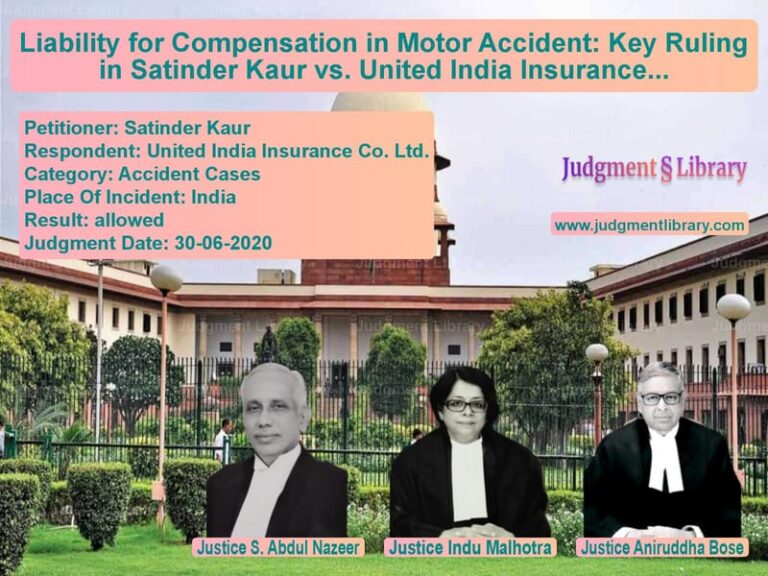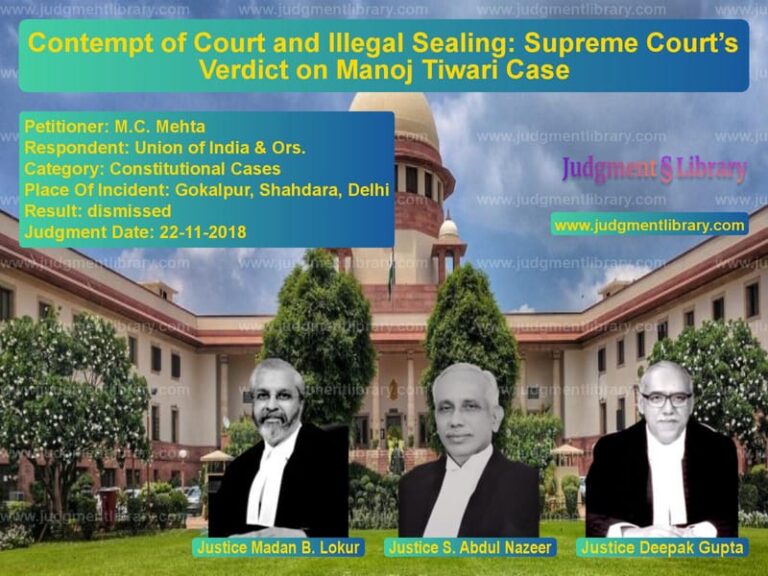Eviction Dispute: Supreme Court Remands Case for Fresh Adjudication
In a significant ruling, the Supreme Court of India addressed the issue of judicial reasoning and the necessity of providing detailed justifications in legal orders. The case of Kushuma Devi vs. Sheopati Devi & Ors. revolved around an eviction dispute where the lower courts had issued unreasoned orders, leading to the Supreme Court remanding the case for fresh adjudication.
The Supreme Court reaffirmed the principle that every judicial order must be well-reasoned and must address the key legal and factual issues involved in the case. The ruling underscores the importance of judicial accountability and the need for courts to provide clear and logical justifications for their decisions.
Background of the Case
The dispute began when the appellant, Kushuma Devi, filed an eviction petition against the respondents, seeking their removal from the premises. The trial court ruled in her favor and passed a decree for eviction. However, the respondents challenged this decision before the first appellate court.
Key events in the case:
- The trial court passed an eviction decree on April 19, 1996.
- The respondents filed an appeal (Rent Appeal No. 4/1996) before the Additional District Judge, Fatehpur.
- The first appellate court allowed the appeal on December 4, 2001, and dismissed the eviction petition.
- Aggrieved by this decision, the appellant approached the Allahabad High Court.
- The High Court dismissed the appellant’s writ petition on July 27, 2012, without providing any detailed reasoning.
- The appellant filed an application for recall of the order, but the High Court dismissed it on January 16, 2013.
- The appellant then approached the Supreme Court seeking relief.
Arguments by the Petitioner (Kushuma Devi)
The petitioner, Kushuma Devi, presented the following arguments:
- The High Court had dismissed her petition without discussing the legal and factual issues involved.
- The impugned order lacked any reasoning, making it difficult for her to understand the basis of the decision.
- The principle of natural justice required courts to provide adequate reasons for their judgments.
- The absence of a well-reasoned judgment deprived her of the opportunity to challenge the findings effectively.
Arguments by the Respondent (Sheopati Devi & Ors.)
The respondents, who had obtained a favorable ruling from the appellate court and the High Court, argued that:
- The eviction petition was rightly dismissed by the first appellate court based on factual findings.
- The High Court had examined the matter and found no substantial reason to interfere.
- There was no requirement for the High Court to provide extensive reasoning in a dismissal order.
- The appeal to the Supreme Court was an attempt to prolong the litigation unnecessarily.
Supreme Court’s Observations and Verdict
The Supreme Court found merit in the petitioner’s arguments and ruled that the High Court’s order was legally unsustainable. The Court observed:
“Every judicial or quasi-judicial order passed by the Court/Tribunal/Authority concerned, which decides the lis between the parties, must be supported with the reasons in support of its conclusion.”
The Court emphasized that judicial accountability requires courts to explain their reasoning, allowing the parties and appellate courts to understand the basis of the decision. It cited various precedents affirming this principle:
- State of Maharashtra vs. Vithal Rao Pritirao Chawan (1981) – The Supreme Court held that orders lacking reasoning are unsustainable in law.
- Jawahar Lal Singh vs. Naresh Singh & Ors. (1987) – The Court ruled that judicial orders must provide clear justifications.
- State of U.P. vs. Battan & Ors. (2001) – Reaffirmed the necessity of reasoned orders in all judicial proceedings.
- Raj Kishore Jha vs. State of Bihar & Ors. (2003) – Stressed that the absence of reasoning undermines judicial transparency.
- State of Orissa vs. Dhaniram Luhar (2004) – The Court held that even summary dismissals must include some reasoning.
Referring to the High Court’s order, the Supreme Court observed:
“The impugned order is an unreasoned order. The High Court neither discussed the issues arising in the case, nor dealt with any of the submissions urged by the parties, and nor assigned any reason as to why it has dismissed the writ petition.”
Final Ruling
The Supreme Court set aside the High Court’s order and remanded the case for fresh adjudication:
“The impugned orders are set aside. The case is remanded to the High Court for deciding the writ petition afresh, out of which these appeals arise, for its disposal in accordance with law keeping in view the observations made above.”
Implications of the Judgment
The ruling reinforces the importance of reasoned judicial orders and establishes that:
- Courts must provide clear and logical reasoning for their decisions.
- Unreasoned dismissals undermine judicial transparency and accountability.
- Litigants have a right to understand the rationale behind judicial decisions.
- High Courts must exercise due diligence in adjudicating matters, particularly in cases involving property disputes and eviction.
This judgment sets a crucial precedent for ensuring fair adjudication and upholding the rule of law in the Indian judiciary.
Petitioner Name: Kushuma Devi.Respondent Name: Sheopati Devi & Ors..Judgment By: Justice Abhay Manohar Sapre, Justice Dinesh Maheshwari.Place Of Incident: Fatehpur.Judgment Date: 08-04-2019.
Don’t miss out on the full details! Download the complete judgment in PDF format below and gain valuable insights instantly!
Download Judgment: Kushuma Devi vs Sheopati Devi & Ors. Supreme Court of India Judgment Dated 08-04-2019.pdf
Direct Downlaod Judgment: Direct downlaod this Judgment
See all petitions in Property Disputes
See all petitions in Landlord-Tenant Disputes
See all petitions in Judgment by Abhay Manohar Sapre
See all petitions in Judgment by Dinesh Maheshwari
See all petitions in Remanded
See all petitions in Remanded
See all petitions in supreme court of India judgments April 2019
See all petitions in 2019 judgments
See all posts in Civil Cases Category
See all allowed petitions in Civil Cases Category
See all Dismissed petitions in Civil Cases Category
See all partially allowed petitions in Civil Cases Category







